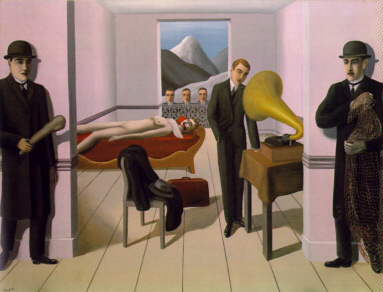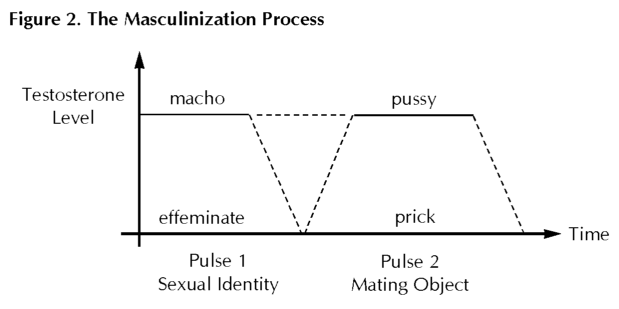
|
The Science of SexHomosexualityAn excerpt from Section 3 ofThe Tyranny of Ambiguity |
SEXUAL DEFINITION CYCLE. Sexual conditioning takes two forms, inherent and adaptive. Inherent male sexuality is fixed by a sequence of hormonal changes which are thought to take place in the foetal male brain around six weeks after conception.
In mammals the default state is to be female. (In birds it is the other way round, that is, the default state is to be male and if a modification process takes place then a female ensues.) The Y chromosome generates a pair of testes, which then produce testosterone to masculinize the brain.
The influence of testosterone is so powerful that it can override the chromosomes. If XX (female) chromosomes are present but, due to some variation, testosterone levels are sufficiently high, a male results, complete with male genitalia. There are other chromosomal deviations so that in reality five or six different sexes exist.
HOMOSEXUALITY. According to evolution theory, homosexuality is not a stable strategy and is therefore highly unlikely to have a genetic origin. A homosexual individual is less likely to produce children and this, reinforced over thousands or millions of generations, clearly implies that conditioning for homosexuality must be something which takes place during the lifetime of the individual (including gestation). This is as certain as there is no such thing as hereditary infertility; one cannot have a eunuch for a father. In Amsterdam there were reports of high levels of promiscuity in both male and female homosexual circles.
MALE HOMOSEXUALITY. According to theory, male homosexuality is the result of the failure or interruption of certain phases in the masculinization process. The modern emphasis on social conditioning is almost certainly unwarranted. What is socially adaptable is biologically determined; one cannot learn to stop breathing, or eating, or many other things. A young male whose first successful sexual experiences were with another male might become conditioned to homosexuality to some extent, but he would be unlikely to continue as a homosexual if he did not like the feelings it inspired in him. Many males have had (or been enticed into) some homosexual encounter at some stage in their lives, but they do not become homosexual. However some otherwise heterosexual males may resort to homosexuality in exceptional circumstances.
Dörner has proposed three phases of the testosterone conditioning sequence:
- Sex centres, determining physical characteristics;
- Mating centres;
- Gender-role, determining gender behaviour.
Diamond suggested four phases:
- Basic sexual patterning, determining aggressiveness or passivity;
- Sexual identity;
- Sexual object choice;
- Control centres for sexual equipment.

There may be ten or twelve different phases. However for illustration we take two characteristics which are common to both the above systems to explain certain distinct male stereotypes. We assume that a first testosterone pulse determines Sexual Identity, while a second determines Mating Object. Figure 2 shows the event chain. Four combinations are therefore possible, according to whether the testosterone pulse fails during the first half of the cycle, the second half of the cycle, during both, or not at all. The four possible outcomes are as follows:
- Full masculine: a male with a masculine gender identity, a potentially aggressive and active individual who is attracted to the opposite sex. In this case testosterone level remains high throughout the masculinization process.
- An individual with a masculine identity who is attracted to other males. This situation would result from an interruption of Pulse 2.
- A male with a feminine gender identity, who may be effeminate and passive, and who is attracted to females. This would arise from disruption of Pulse 1 only.
- A male with a feminine identity who is attracted to males, resulting from an interruption of both Pulse 1 and Pulse 2. (The received wisdom in Amsterdam was that this case was rare.)
FEMALE HOMOSEXUALITY. Female homosexuality poses a more intriguing question. For a normal female the testosterone level remains at or near zero throughout gestation, with little or no pre-conditioning stage. The normal source of testosterone in females is the ovaries and females without ovaries, such as in Turner’s Syndrome, display exaggerated characteristics. They constantly dream of romance, marriage and babies, baby-sit at every available opportunity and display an acute lack of sense of direction, even being capable of getting lost coming home from school or inside their own home.
It can be argued therefore that true female homosexuality is uniquely due to chromosomal aberrations. Such variations are probably rare and consequently the only type of homosexuality in the chromosomally normal female is adaptive. In other words, homosexuality in the vast majority of females is wholly attributable to will.